- Home
- Lou Cameron
Stringer in a Texas Shoot-Out Page 2
Stringer in a Texas Shoot-Out Read online
Page 2
“See if you can pin down his exact time and place of birth,” Barca jumped in, leaning back with sort of dreamy smile. “I’ll want all the vital statistics on the lawman who finally brought the old killer to justice, of course. Find out why they call the place Comanche Woe, and see if we can tie in any other famous shoot-outs to either the town, its law, or both. We can use that old photograph of Mysterious Dave, blown up to two columns across, and …”
“Damn it, Sam!” Stringer blurted, “haven’t you been listening to a word I’ve said? The point I’m trying to make about this story is that there isn’t any damned story! Twenty-odd years ago a pissed-off saloon keeper shot a business rival and had to skip town. Lord only knows where the poor pissant’s been holed up ever since. But thanks to that famous photograph and dramatic nickname, and not another damned thing, he finally wound up dying of gunshot instead of old age in some dinky Texas trail town nobody’s ever heard of!”
Barca nodded, brightly, and replied, “Until now, you mean. I won’t be able to justify your travel expenses unless you turn in enough of a story to run as a main Sunday feature. But, hell, you ought to be able to churn out six or eight thousand words on just the background material alone, right?”
Stringer started to tell Barca he was wrong. Then he considered the meal and train tickets to Texas and back, added the cent a word they were going to give him for the dumb story, and decided, “You’re right, Sam. Mysterious Dave reads a heap more catchy than Fan Tan Tommy Fong, once you study on it.”
Stringer could hardly head for Comanche Woe, Texas, before he found out where in Texas or tarnation it might be. The lady staffer in charge of such matters at the Sun had neither the face, nor the figure to distract a man as much as Miss MacTavish, or any other rivals of the one and original Gibson Girl. She was a friendly old gal who never gave a man any guff, and seemed to know where anything he might ask for had been filed away in the morgue she presided over in her silver-wired specs and dusty smock. She was able to tell him right off that Comanche Woe was even harder to get to than he’d imagined. Tracing across the survey map from her files with a rubber finger guard she wore to guard against paper cuts, Miss Musso, told him, “You can’t get any closer by rail than this jerkwater stop along the Pecos River. That still leaves you a good fifty miles to go, Mr. MacKail. What on earth do you suppose they wanted with a town so far from either the railroad or the river?”
He bent forward to gently move her rubber-tipped finger out of the way so he could read the infernal map himself, as he decided for the two of them, “Makes more sense as a trail town on an unmapped cattle trail betwixt, say, Sierra Blanca in the Rio Grande drainage over to the railroad along the Pecos, by way of this here pass betwixt the Apache and Delaware ranges. See how you could move a market herd down the Cottonwood Draw, here, to the rail yards at Pecos Junction?”
She smiled thinly and said, “You’re the cowhand here. I still say it’s an odd place for even a cowtown. Why would anyone drive herds that far to market from, say, Sierra Blanca when anyone can see there’s a perfectly good rail line running almost parallel to your unmapped cattle trail?”
He cocked a brow at her to protest dryly, “Hold on, ma’am. I never said it was my own grand notion. They likely trailed beef this somewhat shorter route before the Texas and Pacific laid any tracks, and old habits are tough to break. I’ll find out what Comanche Woe is still doing there once I get there. I reckon my best bet would be to drop off here, at Van Horn, and hire me a couple of ponies for the rest of the trip.”
“Won’t that mean riding through those grim-sounding Apache Mountains?” she objected.
He nodded but explained, “This time of the year in West Texas you’re better off in high country than low. The riding distance is only a mite farther and a heap cooler if I follow the tree line up as far as the gap betwixt ranges, about here.” He pictured the country down that way as he thoughtfully added, “Yep, mostly juniper and nutpines, as I recall from the last time I was down yonder, about the time old Roy Bean died with his boots off.”
She shot him a thoughtful look and said, “Oh, that’s right, you were the one who covered that one. Tell me, is it true that old Bean’s half-breed daughter’s a real looker and, well, no better than she should be?”
He frowned back at her to flatly reply, “Both the Bean girls are mighty pretty and too young for any man to meanmouth. As to them being half-breeds, old Judge Bean was a Scot, and I understand his wife was from a fine old Spanish family. What sort of a name might Musso be, if it ain’t too much to ask?”
The file clerk blushed a mortified shade of dusky rose and murmured, “It’s just not true about the Sicilians being Moorish. There were far more Norman crusaders passing through and, anyway, my mother was from Anzio!”
He dryly asked if one could get there via the Texas and Pacific.
She had a nice laugh for such an otherwise undistinguished old gal. He said, “Getting back to this dumb assignment, could you say without looking whether we had any background material on either poor old Mysterious Dave, or the lawman who just shot him, a cuss called, let me see now, Buckskin Jack Blair?”
She laughed again and replied, “Both names sound as if they were made up by Ned Buntline on an off day. We may have something on your older gunfighter. The doings in Dodge attracted a lot of attention in their time. Wasn’t there a Buckskin Somebody associated with Curly Bill, way back when?”
Stringer nodded and said, “Buckskin Frank Lesle. Shot a man in Tombstone and married his widow. She didn’t mind him shooting her first husband as much as she minded old Frank putting bullets in the wall around her in an artistic attempt to draw her profile. After she left him he took up with one Mollie Bradshaw and they got along even worse. Last I heard of Buckskin Frank, he was still serving time in Yuma for killing her.”
Miss Musso agreed the man who’d just killed Mysterious Dave Mather had to be someone else and offered to get right on it. Stringer hauled out his watch, consulted it, and told her, “I have to go home and dress more sensible for West Texas. What say I come back later this afternoon, after you’ve had time to go through your morgue at your own pace?”
She asked what time they were talking about. When he told her four-thirty sounded about right, she looked undecided and said, “I suppose I could manage three. But, you see, I have a dental appointment this afternoon and it’s too late to change it now.”
He answered with as pleasant a frown as he could manage, “That’s cutting it thin if I mean to pick up my railroad tickets and such before coming back. What if you were to just leave anything you dig out for me with old Sam Barca and, that way…”
“What if you dropped by my place, later this evening?” she cut in. “It would surely save me some writer’s cramp. I can’t leave anything out of the files once I lock up. But I’ve a good memory, in case you’ve any questions I might not think to jot down for you as I go through the old records
He agreed that sounded swell. She wrote down her home address on Russian Hill and asked him if he liked meatballs or crab cakes with his pasta. He confided he was not enthusiastic about gnawing anything that had crawled across the bottom of the bay in recent memory and added, “You don’t have to put yourself to that much trouble on my account, Miss Musso. I can likely hold out for supper aboard the S.P. Night Coaster.”
She protested that as long as she had to feed herself it would be no bother to set another plate, and damned if she didn’t manage to tingle her fingers against his as she handed him the paper slip with her name and address on it.
It was a mite late to back out now, and he did want that background material she’d likely serve him along with her fool spaghetti and meatballs. He’d just worry about any other ways she meant to serve him when and if the time came to worry about ’em. With any luck, the poor little mouse lived with her kin and, even if she didn’t, the notion of even kissing a homely gal fresh from her dentist’s needle sounded more comical than tempting.
CHAPTER TWO
Once he got back to his hired digs on Rincon Hill, Stringer changed into duds more suited to West Texas, or any other parts where men still worked outdoors on horseflesh. He’d started out with sensible underwear. So, he only had to haul on faded jeans and spurred Justins, topped by a hickory shirt and denim jacket, before he tied a dark sateen bandana around his tanned throat instead of a fool necktie and put on the old Roughrider Stetson he’d brought back from that war they’d had with Spain.
That Texas cowtown he’d be heading for sounded like a place where they still wore guns. Since Frisco no longer was, he packed his gun rig and an extra box of Savage brand .38 Positives in his battered gladstone, along with other possibles he might not be able to buy cheaply where he was headed.
The first place he headed to from his rooming house was, of course, the Southern Pacific Depot, an easy downhill walk, if he hadn’t been lugging an overloaded gladstone. He checked his damned bag into the baggage room and strode to the ticket windows feeling forty pounds lighter. He was tempted to spring for a Pullman berth, knowing how tedious the night ride down the coast would be. But on reflection, he decided to hold out until the second night out, when he’d really be weary enough to get his full money’s worth out of Mr. George M. Pullman’s halfassed notions of sleeping on the fly.
He stored his coach ticket safely away in his denim jacket and consulted the written directions to Miss Musso’s place as he strode north through the evening rush hour, feeling sort of conspicuous as he noticed how fancy even office boys had taken to dressing in downtown San Francisco of late. He knew it wasn’t all his imagination when he ran for a cable car clanging on up Nob Hill and heard some asshole holler, “Ride ’em, cowboy!”
He caught a grab iron and swung aboard without sarcastic comments of his own. None of the passengers on the crowded rear platform said anything dumb. Up close, Stringer was not the sort of gent one felt safe to josh with. Aside from standing well over six feet without his high-heeled boots on, Stringer’s somewhat feline amber eyes could stare back at you as friendly or downright frigid as you likely deserved and, right now, he was feeling a mite pissed.
He understood why Frisco, almost from the beginning, had wined and dined and dressed fancier than any town west of Paris, France. It was a matter of location and climate. Being so far away from the rest of civilization encouraged Frisco folk to try and keep up with the latest fashions in what they regarded as the fancier parts of the globe. The odd climate that went with the place encouraged them to gussy up as folk in other parts could only gussy in spring or fall. It seldom got hot enough to feel comfortable in shirtsleeves or cold enough to rate a heavy top coat. So, from June to January, a Frisco gal was inclined to go out at night sporting a dead fox around her neck and expecting her dinner date to show up in a suit, vest, and derby hat. Stringer would have put on a fireman’s boots and helmet before he’d have worn high-buttons and a derby, even with his city suit. He still felt a mite shabby as he dropped off the cable car just before it dropped over the north rim of Russian Hill. Miss Musso lived higher on the hog as well as higher up the hill than he’d assumed. Most of the old Frisco families of Sicilian extraction still lived in the saddle between Russian and Telegraph hills, where they got a mite more bay breeze then the folk in Chinatown to their south, but not a hell of a lot. Sam Barca made more on the staff of the Sun than his cousins did on those fishing boats, too, when one studied on it.
As he checked his written directions under a street light, Stringer noticed the building just down the slope and muttered, “Small world,” with a wry smile. The recent bane of his rooming house, that gal on the second landing, was said to work at that very art school as a bare-ass model, about this time of night, as a matter of fact. He hurried up the steps of Miss Musso’s skinny frame house lest that gal on the second landing come along to suspect him of following her to work. He had enough trouble just making it past her damned open doorway, as she sprawled across her damned bed smoking tailor-mades in what seemed to be her working costume. An open kimono seemed as formal as she ever bothered to get.
When another young thing in a more modestly worn kimono opened Miss Musso’s door in answer to his twisting the door bell, he almost asked if her mother was home yet before he reconsidered and settled for just saying howdy. When she answered, “Come in and make yourself at home, Mr. MacKail,” her more familiar voice assured him she really was the female file clerk who’d invited him to supper. The softer gas light in her front vestibule had a lot to do with it, no doubt, but it was still a thundering wonder how a gal could improve her looks that much just by taking off her specs and letting down her severely pinned black hair. He suspected she’d been at her regular if undistinguished features with war paint, too. He was sure about that sandalwood and musk perfume. She’d overdone her stink-pretty just a tad. However, the rest of the place smelled really swell as she led him back to her parlor, saying something about her sauce being almost ready. He could tell she went light on the garlic and heavy on the tomato paste and herbs. He was glad. He liked garlic better when he wasn’t facing a long train ride with strangers who might not fancy his costume to begin with.
As she sat him on a horsehair-stuffed sofa by a low-slung rosewood table of Chinese design, she said he could smoke if he liked, but she didn’t think he ought to go to Texas after all.
She ducked out to stir things up in her kitchen before he could ask her why. He’d finished rolling and lighting one by the time she came back out, packing a pad of ruled yellow notepaper. She sat down beside him and said, ‘I just put the pasta in the double boiler. It should be done in a minute. There’s no mystery at all about Mysterious Dave Mather. He was born in Saybrook, Connecticut, on the tenth day of August, in 1851, if you want to get picky. So, he wasn’t even a westerner to begin with.”
Stringer smiled indulgently and pointed out, “Hardly anyone was in the old days, save for Indians, that is. Folk had to come west from back East before western kids like you and me could get born out this way. Billy the Kid was born in New York. The Sundance Kid was born in New Jersey, and they tell me Chris Madsen, the quick-draw champ of Oklahoma, grew up in Denmark and never spoke English until he was in his twenties.”
Stringer reflectively took a drag on his smoke before he chuckled and added, “That’d teach an old boy how to fight, fast, if he worked for some of the outfits I rode with in my misspent youth.”
She shrugged and said, “Be that as it may, Mysterious Dave, better known to his kith and kin as David Allan Mather, came west along with his brother, Joshua Wright Mather, and both registered to vote in Dodge City in the early 1880s. Excuse me, I’d better see if our pasta is ready to serve.”
He started to call her back as she loped out in that thin kimono again. He hated to be teased by either a storyteller or a full-figured gal wearing nothing under shiny black silk. He suspected that, being female to begin with, she knew full well the affect her shape and sandalwood scent might have on a poor helpless male. He still didn’t follow her drift about Mysterious Dave. It stood to reason other reporters had probed into his past since he’d managed to get so famous as a sinister stranger. Stringer was pleased to hear he’d guessed the old timer’s age about right. Where his days and nights on the owlhoot trail had led him the last twenty-odd years was still a mystery.
Stringer had already pondered some on the various ways a man could vanish so totally long enough for his Wanted posters to vote and still get spotted by the law to go down in a blaze of glory.
Miss Musso came back to inform him supper was both ready and being served in her kitchen, so he got rid of his hat and smoke to follow her. When they got there, he saw she’d spread a checked cloth, a bottle of Napa Valley Red and more Italian grub than ten hungry wolves could have eaten, for just the two of them. She asked him to open the wine as she dished out the spaghetti and meatballs. When she saw what a good sport he was about that, she confided that her first name was Gina and that she didn’t mind if he call
ed her that, seeing they were dining so informal in her kitchen.
He said he would, and confided that his kin had dubbed him Stuart, adding, “Just so you don’t call me Stu. I know folk mean well. It still reminds me of a lot of cowcamp swill I’ve been served in my misspent youth.”
She dimpled at him and rewarded him for his honesty with an extra meatball as she told him she’d always wondered why he put up with the other gents at work referring to him as Stringer. She asked if he didn’t think that was as lowly a title as Stuart, and he replied with a shake of his head, “I’d rather be named after my job, humble as it may be, than a royal family distinguished more by pride than common sense. My ancestors in the old country couldn’t have been much brighter, when you study on the history of the place. My clan fought for the Stuart Cause, which is how much of us wound up in America. When they got here they were as hazy as most losers about recent history. So, I reckon they considered it an honor when they started naming us poor Scotch-American kids after womanizing drunks. But I digress, and you were telling me why I shouldn’t do that feature on the late Mysterious Dave.”
She washed down some pasta with wine to explain, “You can do that on the notes I made for you from our morgue. I wired the county seat in Texas for more stuff on the scene of Mysterious Dave’s not at all mysterious death. You were right about Comanche Woe being a trail town near the headwaters of Cottonwood Draw, and the cattle trail does run down to the Pecos along said draw, just as you guessed.”
Stringer nodded, washed his mouth fresh with astringent red wine, and said he’d no doubt pick up more interesting details once he got there. She shook her head, swirling her long black hair insistently as she warned, “Getting there is easier than leaving, according to their own sheriff’s department. You were right about those railroad tracks as well. Comanche Woe’s gone back to being sort of inbred and surly since its day in the sun. Today there’s nothing much there but a post office and a handful of saloons and shops serving the local cattle spreads. I recall tales of mountain towns like that in my own motherland. Strangers stand out like sore thumbs, and the sullen results of incestuous breeding greet them with the Sign of the Cross and mutter remarks about the Evil Eye. The county coroner says it’s no wonder Mysterious Dave Mather was spotted on his way through Comanche Woe. A few years back they lynched a couple of Mexicans just for showing up uninvited at a local barn dance.”

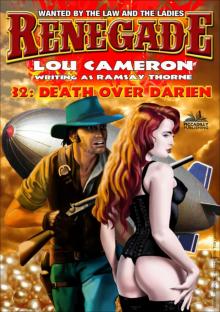 Renegade 32
Renegade 32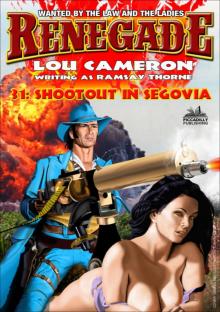 Renegade 31
Renegade 31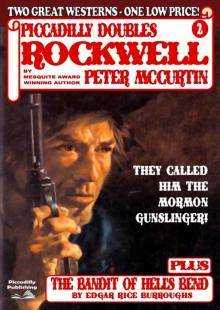 Piccadilly Doubles 2
Piccadilly Doubles 2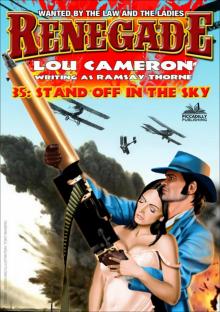 Renegade 35
Renegade 35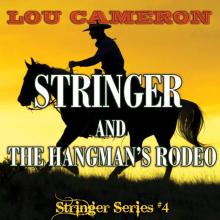 Stringer and the Hangman's Rodeo
Stringer and the Hangman's Rodeo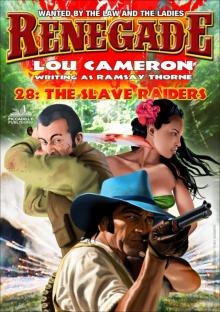 Renegade 28
Renegade 28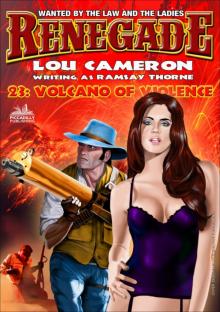 Renegade 23
Renegade 23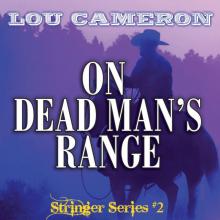 On Dead Man's Range
On Dead Man's Range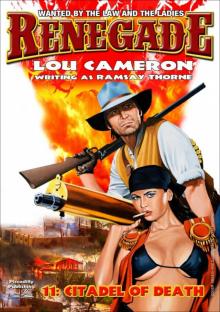 Citadel of Death (A Captain Gringo Western Book 11)
Citadel of Death (A Captain Gringo Western Book 11)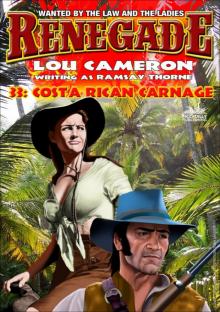 Renegade 33
Renegade 33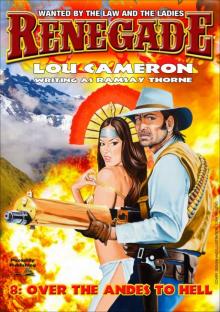 Over the Andes to Hell (A Captain Gringo Western Book 8)
Over the Andes to Hell (A Captain Gringo Western Book 8)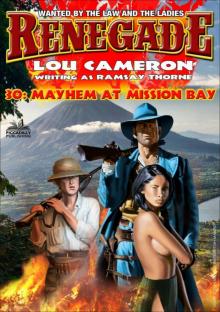 Renegade 30
Renegade 30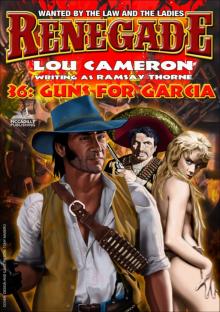 Renegade 36
Renegade 36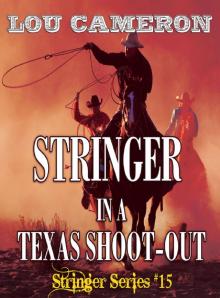 Stringer in a Texas Shoot-Out
Stringer in a Texas Shoot-Out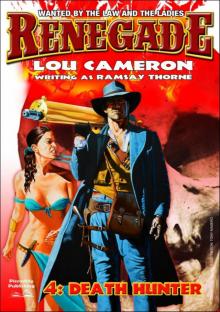 The Death Hunter
The Death Hunter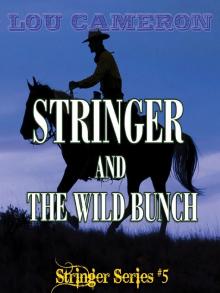 Stringer and the Wild Bunch
Stringer and the Wild Bunch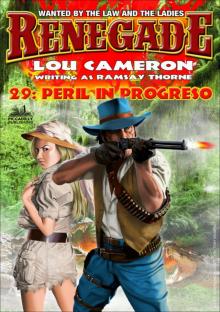 Renegade 29
Renegade 29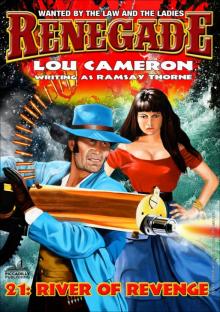 Renegade 21
Renegade 21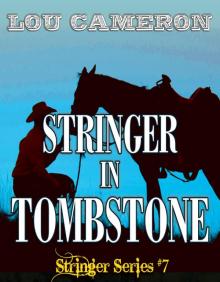 Stringer in Tombstone
Stringer in Tombstone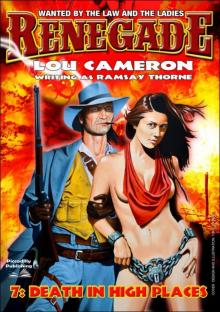 Death in High Places (A Renegade Western Book 7)
Death in High Places (A Renegade Western Book 7)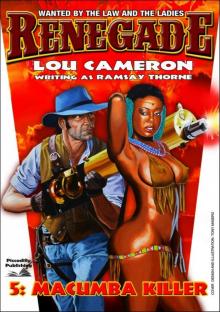 Macumba Killer
Macumba Killer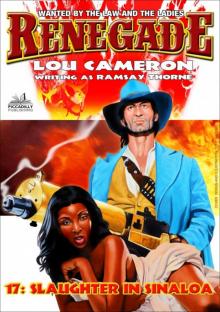 Renegade 17
Renegade 17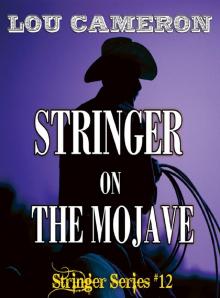 Stringer on the Mojave
Stringer on the Mojave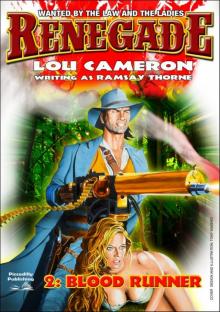 Blood Runner
Blood Runner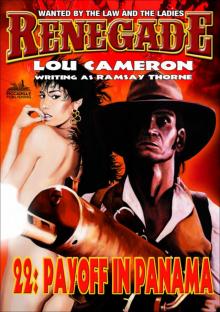 Renegade 22
Renegade 22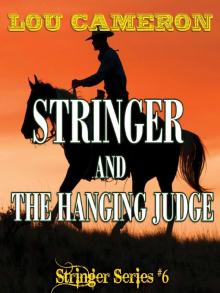 Stringer and the Hanging Judge
Stringer and the Hanging Judge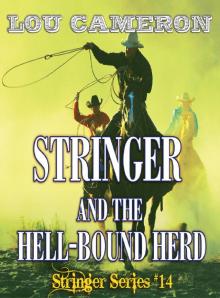 Stringer and the Hell-Bound Herd
Stringer and the Hell-Bound Herd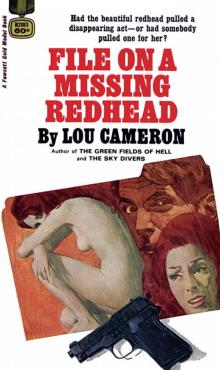 File on a Missing Redhead
File on a Missing Redhead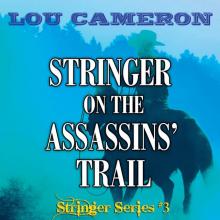 Stringer on the Assassins' Trail
Stringer on the Assassins' Trail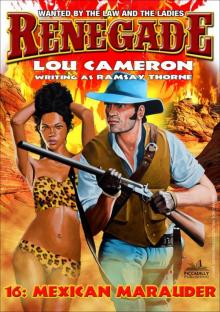 Mexican Marauder (A Captain Gringo Adventure #16)
Mexican Marauder (A Captain Gringo Adventure #16)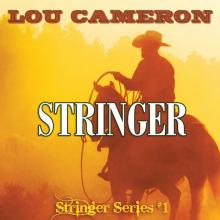 Stringer
Stringer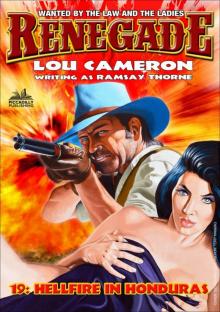 Renegade 19
Renegade 19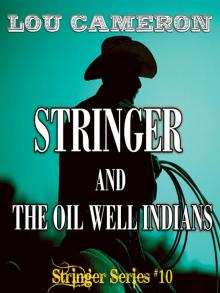 Stringer and the Oil Well Indians
Stringer and the Oil Well Indians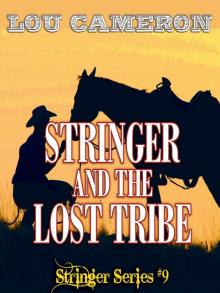 Stringer and the Lost Tribe
Stringer and the Lost Tribe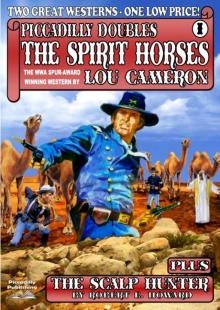 Piccadilly Doubles 1
Piccadilly Doubles 1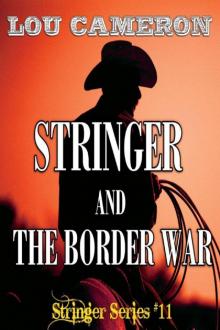 Stringer and the Border War
Stringer and the Border War Renegade
Renegade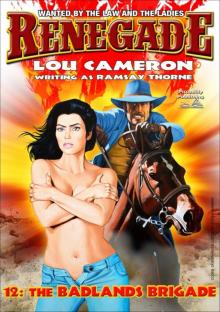 The Badlands Brigade (A Captain Gringo Adventure Book 12)
The Badlands Brigade (A Captain Gringo Adventure Book 12)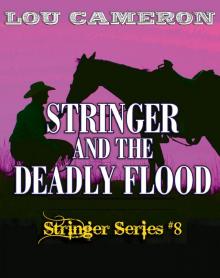 Stringer and the Deadly Flood
Stringer and the Deadly Flood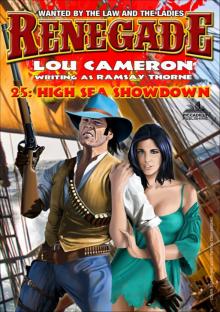 Renegade 25
Renegade 25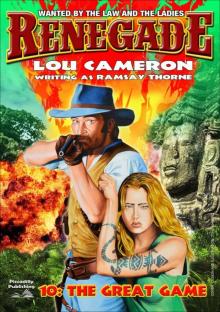 The Great Game (A Captain Gringo Western Book 10)
The Great Game (A Captain Gringo Western Book 10)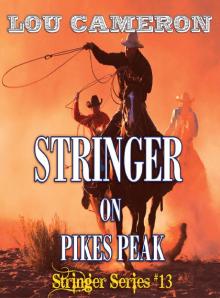 Stringer on Pikes Peak
Stringer on Pikes Peak